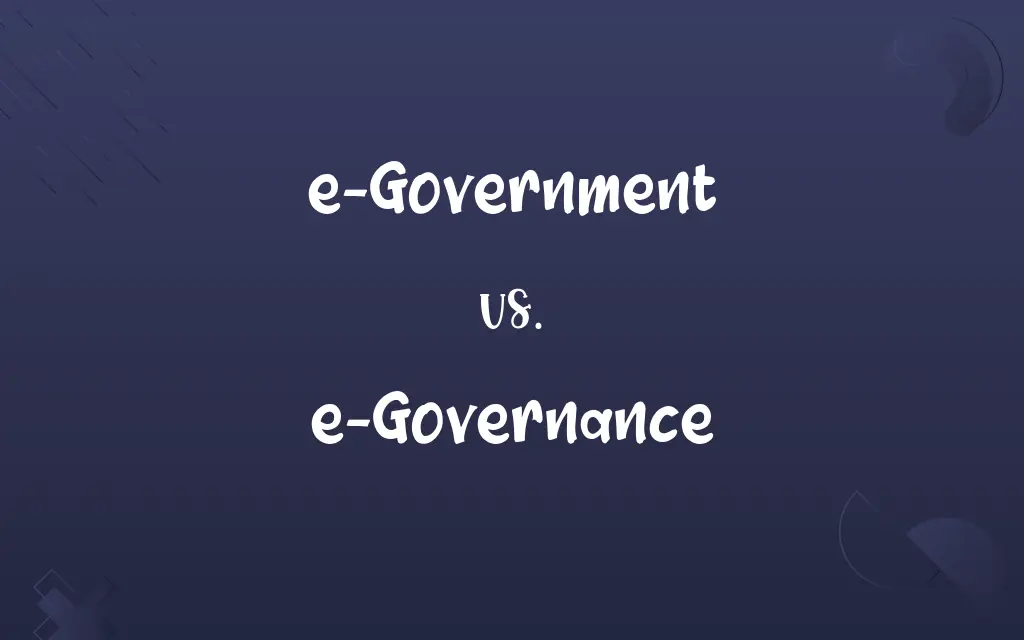e-Government vs. e-Governance: Know the Difference

By Shumaila Saeed || Published on February 5, 2024
e-Government involves using digital tools for administrative and governmental processes, while e-Governance refers to the use of technology to enhance governance and public participation.

Key Differences
e-Government primarily deals with the digitalization of government services, aiming to streamline administrative processes. e-Governance, on the other hand, focuses on using technology to foster good governance practices, enhancing transparency and public engagement.
Shumaila Saeed
Feb 05, 2024
e-Government is concerned with improving government service delivery, efficiency, and accessibility. e-Governance extends beyond service delivery to include participatory elements, decision-making processes, and democratic engagement.
Shumaila Saeed
Feb 05, 2024
In e-Government, technology is used for internal government operations and public services. In e-Governance, technology facilitates interaction between government, citizens, and other stakeholders, encouraging collaboration and feedback.
Shumaila Saeed
Feb 05, 2024
The objective of e-Government is to make government operations more efficient and user-friendly. e-Governance aims to make governance more transparent, accountable, and inclusive.
Shumaila Saeed
Feb 05, 2024
e-Government primarily benefits citizens and businesses through improved service delivery. e-Governance involves citizens more directly, engaging them in policy-making and governance processes.
Shumaila Saeed
Feb 05, 2024
ADVERTISEMENT
Comparison Chart
Focus
Digitalization of government services
Enhancing governance with technology
Shumaila Saeed
Feb 05, 2024
Scope
Limited to government operations
Broader, includes public participation
Shumaila Saeed
Feb 05, 2024
Objective
Efficiency in service delivery
Transparency, accountability, and inclusiveness
Shumaila Saeed
Feb 05, 2024
Technology Usage
For internal operations and service delivery
For interaction, collaboration, and feedback
Shumaila Saeed
Feb 05, 2024
Main Beneficiaries
Citizens as service users
Citizens as participants in governance
Shumaila Saeed
Feb 05, 2024
ADVERTISEMENT
e-Government and e-Governance Definitions
e-Government
It involves the digitalization of administrative processes.
E-Government has made filing government paperwork much more efficient.
Shumaila Saeed
Jan 08, 2024
e-Governance
It promotes transparency and accountability in governance.
Through e-Governance, government spending is more transparent to the public.
Shumaila Saeed
Jan 08, 2024
e-Government
E-Government refers to the use of digital technologies in government operations.
The city's e-Government platform allows residents to pay taxes online.
Shumaila Saeed
Jan 08, 2024
e-Governance
E-Governance facilitates citizen engagement in decision-making.
Citizens used an e-Governance portal to voice opinions on new city policies.
Shumaila Saeed
Jan 08, 2024
e-Government
It focuses on internal government processes.
The e-Government system has automated many routine administrative tasks.
Shumaila Saeed
Jan 08, 2024
ADVERTISEMENT
e-Governance
It encompasses technology-driven democratic processes.
E-Governance tools have been crucial in conducting online surveys for public opinion.
Shumaila Saeed
Jan 08, 2024
e-Government
E-Government aims to improve public service delivery.
E-Government initiatives have streamlined the process of obtaining driving licenses.
Shumaila Saeed
Jan 08, 2024
e-Governance
E-Governance uses technology to enhance governance practices.
E-Governance platforms enable citizens to participate in public consultations online.
Shumaila Saeed
Jan 08, 2024
e-Government
E-Government enhances government accessibility and efficiency.
Thanks to e-Government, citizens can now access municipal services 24/7 online.
Shumaila Saeed
Jan 08, 2024
e-Governance
E-Governance aims for inclusive and participatory governance.
E-Governance has made it easier for marginalized groups to engage in policy discussions.
Shumaila Saeed
Jan 08, 2024
Repeatedly Asked Queries
What role does technology play in e-Governance?
In e-Governance, technology acts as a facilitator for greater transparency, accountability, and public engagement in governance.
Shumaila Saeed
Feb 05, 2024
How does e-Government benefit citizens?
e-Government benefits citizens by providing more efficient, accessible, and convenient government services.
Shumaila Saeed
Feb 05, 2024
Can e-Government reduce bureaucratic red tape?
Yes, e-Government can significantly reduce bureaucratic red tape by automating and digitizing processes.
Shumaila Saeed
Feb 05, 2024
What is e-Government?
e-Government involves using digital tools to streamline government operations and improve public service delivery.
Shumaila Saeed
Feb 05, 2024
Can e-Government save costs for governments?
Yes, e-Government can lead to significant cost savings through improved efficiency and reduced paperwork.
Shumaila Saeed
Feb 05, 2024
What is e-Governance?
e-Governance refers to the use of technology to enhance the quality of governance and encourage public participation.
Shumaila Saeed
Feb 05, 2024
Does e-Governance involve only the government and citizens?
e-Governance involves not just government and citizens but also other stakeholders like businesses and NGOs.
Shumaila Saeed
Feb 05, 2024
Is e-Government mainly about online services?
While online services are a big part of e-Government, it also includes back-end digitalization of government operations.
Shumaila Saeed
Feb 05, 2024
How does e-Governance improve democratic processes?
e-Governance improves democratic processes by enabling easier and more inclusive public participation and feedback.
Shumaila Saeed
Feb 05, 2024
Are e-Government services accessible to all?
While e-Government aims to be accessible to all, challenges like digital divide can limit access for some groups.
Shumaila Saeed
Feb 05, 2024
Can e-Governance help in policy formulation?
Yes, e-Governance can aid in policy formulation by gathering diverse public opinions and feedback.
Shumaila Saeed
Feb 05, 2024
What are the limitations of e-Governance?
Limitations of e-Governance include digital literacy gaps, infrastructure requirements, and ensuring inclusive participation.
Shumaila Saeed
Feb 05, 2024
How does e-Government handle data security?
e-Government systems implement various security measures to protect sensitive data and ensure privacy.
Shumaila Saeed
Feb 05, 2024
How does e-Governance impact citizen trust in government?
e-Governance can increase citizen trust by making governance more transparent and responsive.
Shumaila Saeed
Feb 05, 2024
Does e-Governance ensure fair policy implementation?
e-Governance can contribute to fairer policy implementation by involving diverse public insights and oversight.
Shumaila Saeed
Feb 05, 2024
How does e-Governance promote accountability?
e-Governance promotes accountability by making government actions and decisions more visible and accessible to the public.
Shumaila Saeed
Feb 05, 2024
Is technical expertise required to use e-Government services?
e-Government services are designed to be user-friendly, but some level of digital literacy is often necessary.
Shumaila Saeed
Feb 05, 2024
Can e-Government services be accessed offline?
Some e-Government services may have offline components, but the emphasis is on digital access.
Shumaila Saeed
Feb 05, 2024
How does e-Governance affect civic engagement?
e-Governance often leads to increased civic engagement by providing easier and more accessible channels for public participation.
Shumaila Saeed
Feb 05, 2024
What challenges does e-Government face?
Challenges for e-Government include security concerns, maintaining privacy, and ensuring user-friendly interfaces.
Shumaila Saeed
Feb 05, 2024
Share this page
Link for your blog / website
HTML
Link to share via messenger
About Author
Written by
Shumaila SaeedShumaila Saeed, an expert content creator with 6 years of experience, specializes in distilling complex topics into easily digestible comparisons, shining a light on the nuances that both inform and educate readers with clarity and accuracy.









































































